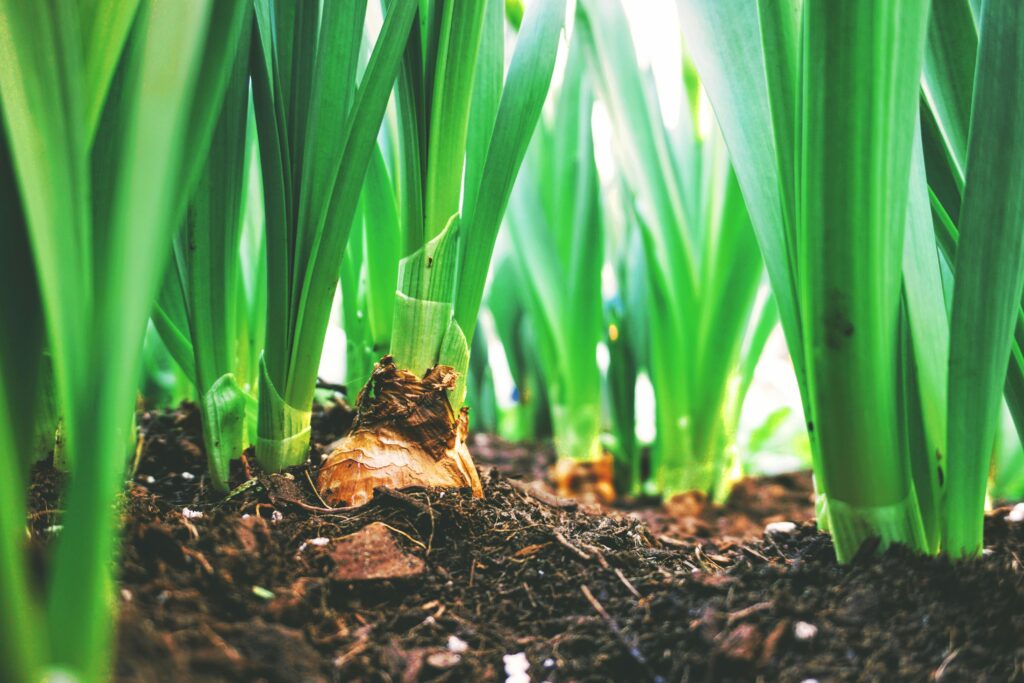Stonecoast Review
The Literary Journal of the Stonecoast MFA
Not the Tulips I Was Expecting

By Jessica Klimesh
In late October, I plant the bulbs, excavating dirt with my trowel. Soil, my mom corrects me, not dirt. She watches, bundled in blankets, from her wheelchair as I set each bulb six inches deep and backfill the holes. I’m weeks late with them; there’s already been a frost. Do you think they’ll come up in the spring? I ask. But my mom just shrugs, indifferent. We both know she’ll be gone by then.
I give the ground a thorough soaking with the hose, and we go inside to wait.
My mother dies in mid-December.
#
Tulips only last a couple of weeks before they fade away. Perennials. They sing their song each spring, then make their exit. When I moved to the Midwest to care for my mother, I wanted a garden. New life. Old life. Circle of life. I started with indoor succulents, a jade plant, and soon had three cuttings. In matching clay pots, the plants bask in the east window’s sun. Then my mother gave me the tulips, housed in a large glass container, for some color. She was still able to walk then, still able to drive. Got them from the Kroger. After the flowers wilted, I followed the instructions I’d read online. Kept the bulbs cool and dry until the fall.
My mother always wanted a grandchild, and I, a child, but this was the best I could do. Plants and my dog, Lily. You can’t force these things, I’d always told her, but she’d just shake her head in disappointment, and say yes, you can. And then for emphasis, she’d flex her arm muscles and say that you just have to be stronger than your destiny. Hardy, she’d say. It was one of her favorite words.
#
Near the end of March, three months without her, I see the first signs of life poking out of the dirt. Soil. Not the tulips I was expecting, but round, fat heads of human babies, their eyes shut tight against the burgeoning spring sun.
Their heads emerge in shades of pink, orange, and peach, the colors of the original buds. When they finally open their eyes, I see how big with wonderment they are, watching everything. I hear their coos and soft cries. Sometimes not so soft.
Though my breasts are dry, it rains enough that I don’t need to supplement the babies’ nourishment. A warm rain that seems to sustain and nurture them. On walks with Lily, I inspect other people’s gardens. I crane my neck, peek behind fences. But as far as I can tell, I’m the only one with babies growing in my yard.
#
The heads give way to shoulders. Lily sniffs the fussy newborns and looks at me, accusatory, as though it’s my fault. They have a baby smell, a potpourri of milk and sugar, soap and petal.
The April sun beams down on them, but it’s not too hot yet. I gaze at the babies, and wonder if I should pick them, put them in a vase.
The shoulders soon become arms, and the arms reach out to me. I feel their want, and think of my mother.
Lily gets too close, and one baby squawks, annoyed and cranky. I offer comfort, touch the baby’s cheek. Just a brief wisp of skin on skin. I don’t want to get too attached.
#
When I was little, we had a small garden at the side of our house, where my mom grew rhubarb and cherry tomatoes. I popped those tomatoes in my mouth like candy. And one year, her rhubarb pie—with meringue on top—came in second in a pie contest. Each summer, I helped her weed and water the flowers. I helped her plant the annuals, always geraniums and marigolds, and we’d watch for the perennials, the daylilies and hostas, to bloom. She’d explain how perennials were less work than annuals, how they go dormant in the winter. Hardy. Can survive anything. Like us, she’d say.
#
Within a couple of weeks, the babies’ crying becomes fainter. They sleep more, their eyes drooping shut, so much like my mother in her last days. I tell the babies I’ll see them next year, and wonder if they’ll remember me.
Before she passed, I told my mother sorry, and she understood why, but by the end, it didn’t matter. She apologized, too.
#
The babies no longer reach for me, and Lily sniffs the ground but her focus is on mole holes now. Perennials, I tell Lily. They’re hardy like us. They’ll be back.
END
JESSICA KLIMESH (she/her) is a US-based writer and editor whose creative work has appeared or is forthcoming in Flash Frog, Cleaver, Atticus Review, trampset, Flash Boulevard, and Whale Road Review, among others. Her work has been nominated for the Pushcart Prize, Best Microfiction, Best Small Fictions, and Best of the Net. Learn more at jessicaklimesh.com.
This story originally appeared in Stonecoast Review Issue 21.
Photo by Maarten van den Heuvel
